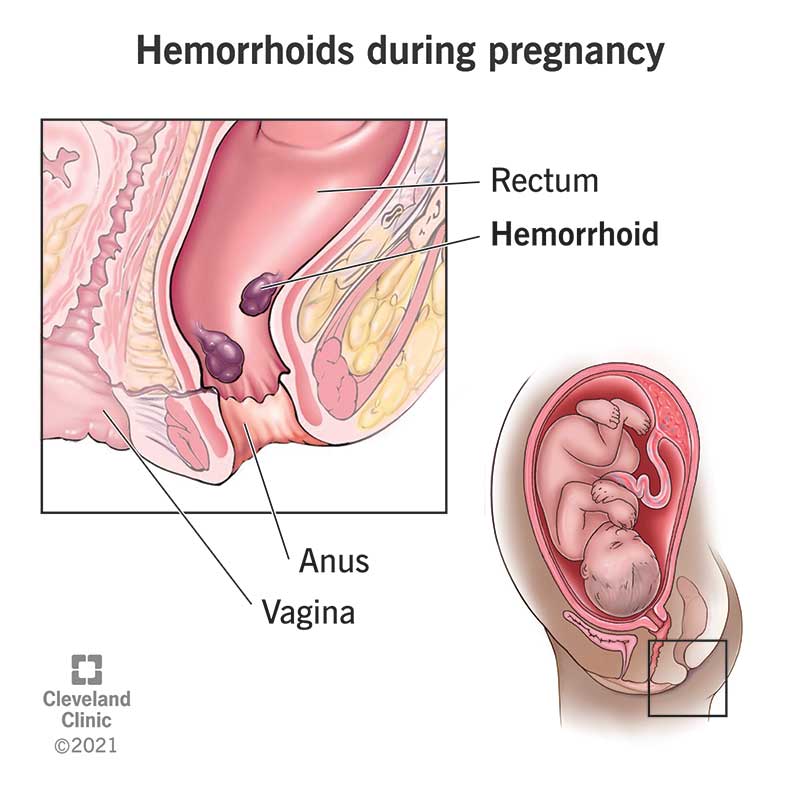Hemorrhoids are swollen veins around your anus that can make pooping extremely unpleasant when you’re pregnant. They’re common in pregnancy and usually go away after you have your baby. In the meantime, you can make changes to your daily choices that can help soothe your symptoms. Your healthcare provider can recommend treatments, too.
Advertisement
Cleveland Clinic is a non-profit academic medical center. Advertising on our site helps support our mission. We do not endorse non-Cleveland Clinic products or services. Policy

Image content: This image is available to view online.
View image online (https://my.clevelandclinic.org/-/scassets/images/org/health/articles/23498-pregnancy-hemorrhoids)
Hemorrhoids are swollen veins inside your rectum or around your anus (butthole). They can cause itching, discomfort and bleeding when you poop. The good news is that they’re usually easy to manage with at-home treatments. They often go away after you deliver your baby.
Advertisement
Cleveland Clinic is a non-profit academic medical center. Advertising on our site helps support our mission. We do not endorse non-Cleveland Clinic products or services. Policy
If you’re pregnant and have hemorrhoids, you’re not alone. They’re common, especially in the third trimester. About 30% to 40% of pregnant women get hemorrhoids.
You can have hemorrhoids without having any symptoms at all. If you do have symptoms, they may include:
It can be scary to see blood in the toilet after pooping, but rectal bleeding from hemorrhoids is usually harmless. Still, see your provider about any bleeding you notice if you’re pregnant.
Hemorrhoids develop when extra pressure builds up in your pelvic area and lower digestive tract. This pressure causes the veins around your anus and rectum to stretch and swell. The swollen veins can sometimes break open. This is the blood you see on toilet paper, in the toilet bowl or in your poop.
Anyone can get hemorrhoids, but your risk is higher when you’re pregnant. The pressure on your veins comes from:
Advertisement
Hemorrhoids during pregnancy are common enough that your provider will know that you have them by how you talk about your symptoms. To be sure, your provider may:
The goal of treatment is to manage or relieve your symptoms. Hemorrhoids usually improve dramatically or go away completely after your baby arrives. Until then, treatment usually involves at-home remedies and changing your habits to promote healthy bowel movements.
Having regular bowel movements can ease the strain on your hemorrhoids. The less you’re straining on the toilet, the less stress you’re putting on these veins. Here’s how you do it:
Try some home remedies for hemorrhoids to relieve any discomfort you feel:
Here are some tips you can use throughout the day to help:
If at-home care isn’t working, your healthcare provider may recommend a procedure to remove your hemorrhoids. This is rarely necessary.
If constipation is making your hemorrhoids unbearable, your healthcare provider may prescribe a laxative, hemorrhoid cream or fiber supplement. Always check with your provider before taking any over-the-counter medications. Your provider is your best resource for making sure you’re choosing options that are effective and safe for pregnancy.
Tell your healthcare provider about your hemorrhoids if:
Advertisement
You’ll likely have some discomfort that you and your healthcare provider can work together to fix. At-home treatments and small changes to your habits usually work well. Most hemorrhoids are harmless and don’t cause complications. Still, they can be uncomfortable and annoying to deal with.
Sometimes, pushing during labor makes hemorrhoids worse immediately after delivery. Within a few weeks, though, your hemorrhoids should get better.
After a hemorrhoid goes away, it may leave a skin tag on your anal opening. These are typically harmless. Mention it to your healthcare team so they can check it.
No. Hemorrhoids aren’t dangerous for a fetus at all.
You can’t always prevent hemorrhoids. But you can put good habits in place to reduce your chances of getting constipated. Eat fiber-rich foods and drink lots of fluids each day. Work Kegel exercises into your daily routine to encourage healthy circulation in your anus and rectum.
Hemorrhoids can be an uncomfortable and even embarrassing part of pregnancy. But don’t worry if you have them. They’re common and usually harmless. Relieving constipation and finding ways to soothe your symptoms can help make them more manageable.
If your symptoms are bothering you and home treatments aren’t helping, reach out to your provider. Don’t take any supplements or medications until you speak with them.
Advertisement
Learn more about the Health Library and our editorial process.
Cleveland Clinic's health articles are based on evidence-backed information and review by medical professionals to ensure accuracy, reliability, and up-to-date clinical standards.
Cleveland Clinic's health articles are based on evidence-backed information and review by medical professionals to ensure accuracy, reliability, and up-to-date clinical standards.
From routine pelvic exams to high-risk pregnancies, Cleveland Clinic’s Ob/Gyns are here for you at any point in life.
